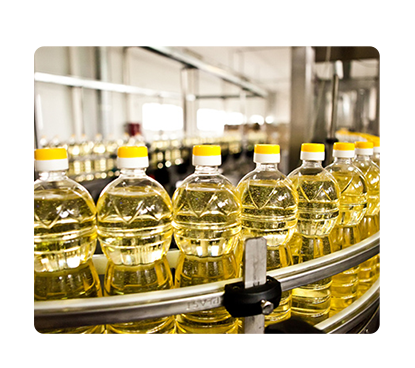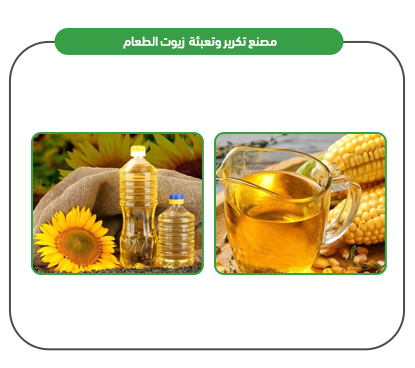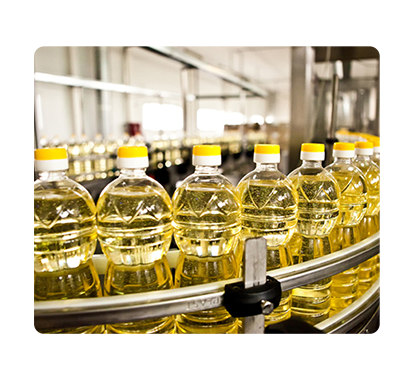Mashroo3k Economic Consulting offers a feasibility study for a cooking oil refining and packaging plant project, aiming to achieve the highest return on investment and the best payback period. This is accomplished through in-depth studies of the Qatari market size, analysis of local and international competitor strategies, and the provision of competitive pricing offers.

The edible oil refining and packaging factory specializes in refining and packaging sunflower oil and corn oil in various bottle sizes. The factory targets wholesalers, retailers, restaurants, and hotels.
Mashroo3k Economic Consulting provides feasibility studies that include the possibility of supplying production lines capable of delivering edible oil refining products that meet international standards—enabling them to be exported to other countries.
Mashroo3k Economic Consulting Company provides investors wishing to invest in an edible oil refining and bottling plant project in Qatar with a set of specialized feasibility studies, based on updated databases specific to the Qatari market, which helps the success of the project and achieve the highest profitable return and the best payback period.

The edible oil refining and packaging process goes through several stages to remove foreign matter, gums, waxes, and fatty acids present in the oil as a result of its decomposition, as well as natural colorings and volatile substances responsible for odor. Mashroo3k Economic Consulting Company ensures that a successful edible oil refining and packaging plant project incorporates the latest oil refining technology and relies on a fully operational team characterized by its ability to innovate and renew.
Mashroo3k Economic Consulting Company directs investors who wish to invest in an edible oil refining and bottling plant project, or develop their already existing projects, to seek the opinions of specialized consultants through Mashroo3k Company, to help them determine the best ways and methods to develop the factory’s services and raise its competitive advantages.


Executive summary
Study project services/products
Market Size Analysis
Risk Assessment
Technical study
Financial study
Organizational and administrative study

The GCC countries comprise just 0.7% of the world’s population; however, they account for 3% of global spending on processed food and beverages—amounting to USD 102 billion out of a global total of USD 3.4 trillion. This indicates a high per capita consumption of food in the region, surpassing the global average. This is not surprising when examined closely: the population of the GCC now exceeds 58 million, and approximately 56.3% of this population falls within the age group of 25 to 54 years—a dynamic and youthful segment that underpins the food industry market more than any other demographic.
Given that Saudi Arabia alone accounts for approximately 59.7% of the total population in the GCC and over 53% of the region’s food and beverage market, Mashroo3k has chosen to present key indicators for this vital market within the Kingdom, based on the latest available data:
By the end of Q2 2021, there were around 916 food product factories in Saudi Arabia, with an additional 249 factories under construction.
The number of beverage factories stood at 209, with 71 more under development.
Food product factories represent 11.1% of the total number of operational factories in the Kingdom (8,258 factories), while beverage factories account for 2.5%.
The food and beverage market in Saudi Arabia was valued at approximately SAR 168.8 billion.
By the end of 2021, food consumption reached SAR 221 billion, marking a 6% growth.
According to global reports, food consumption in Saudi Arabia amounts to USD 70 billion, representing 60% of total food consumption across the Gulf region.
The fast-food market in Saudi Arabia is expected to reach USD 4.5 billion within the next three years.
The organic, healthy, and specialty foods market is estimated at USD 27 billion, while the halal food market alone is valued at USD 6 billion.
Saudi Arabia imports around USD 14.5 billion worth of food and beverage products annually.
In 2020, operational expenditures for food and beverage service activities were estimated at SAR 34,032.10 million, up from SAR 30,069.23 million in 2018.
Operating revenues for food and beverage service activities in 2020 were approximately SAR 61,557.77 million, compared to SAR 54,866.87 million in 2018.
By 2027, operational expenditures for these activities are projected to reach SAR 52,489.34 million, while revenues are expected to rise to SAR 92,084.64 million.
The total expected operational revenue for the food manufacturing sector in Saudi Arabia in 2027 is SAR 128,540.573 million.
Global Food Sector Overview:
According to UNICEF, the global malnutrition index rose to 9.8% in 2021.
Between 702 and 828 million people around the world suffer from hunger.
The global food market generates approximately USD 8.66 trillion in revenue.
Online channels are expected to account for 7.8% of total food market revenues.
Global production of primary crops totals 9.4 billion tons.
Global production of red and white meat reaches 337 million tons.
Fruit production stands at 883 million tons worldwide.
Vegetable production amounts to 1,128 million tons.
Global production of vegetable oils is around 201 million tons.
Dairy production totals 883 million tons globally.
Egg production reaches 83 million tons worldwide.
